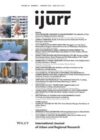Shrinking cities are increasingly drawing global attention, but urban shrinkage is seldom considered as an enduring structural condition necessitating a move beyond growth-centric strategies. The focus often remains on mitigating symptoms rather than embracing the broader implications of long-term decline. Understanding of what drives decision-makers to shift from mere recognition to acceptance of shrinkage, and to rethink conventional responses, remains underexplored. Drawing on Schmidt’s discursive institutionalism, this study examines how discourse drives institutional change in two European regions: Parkstad Limburg in the Netherlands, and Satakunta in Finland. Our analysis goes beyond agenda-setting to examine how discourse on shrinking cities evolves, enabling decision-makers not only to recognize the problem but also to acknowledge its profound implications and complex challenges. We conclude that accepting shrinkage necessitates optimistic reframing, robust knowledge generation and national-level engagement. While contextual factors play a role, acceptance is unlikely without addressing these critical dimensions.
Details
Written by:
Marjan Marjanović, Johanna Lilius
Digital Object Identifier (DOI)
https://doi.org/10.1111/1468-2427.70029
About DOI
